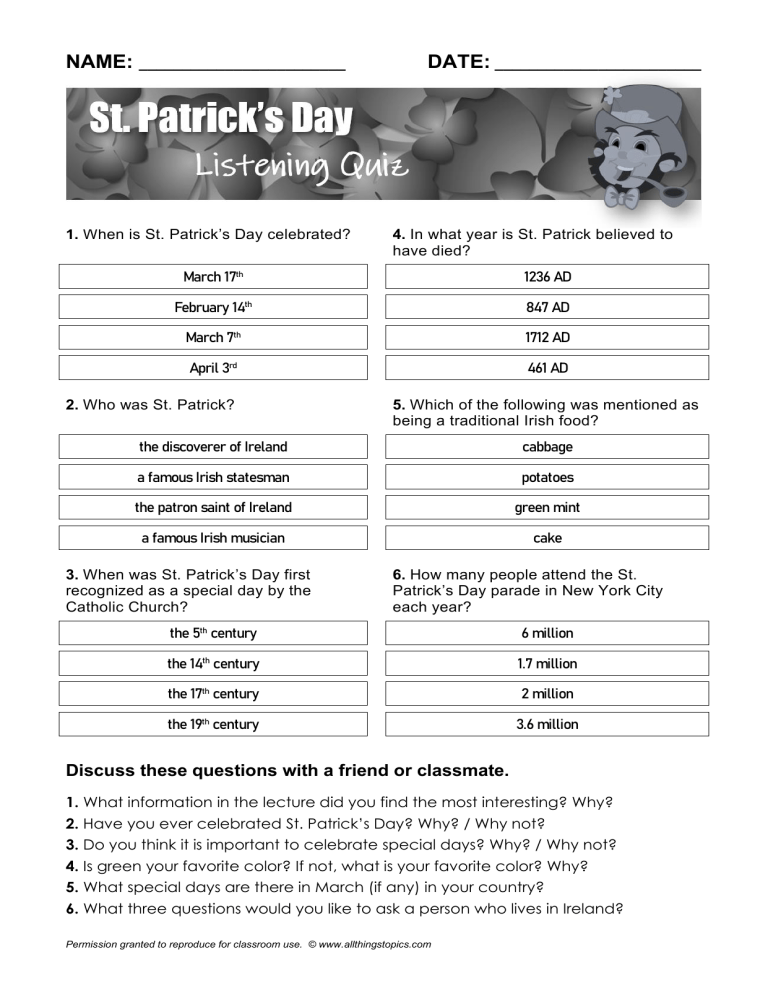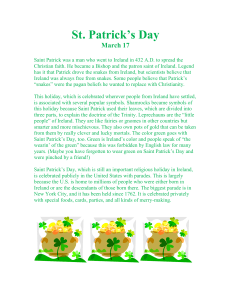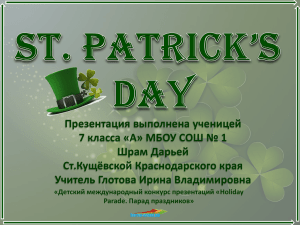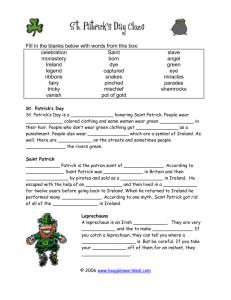
NAME: ________________________ 1. When is St. Patrick’s Day celebrated? DATE: ________________________ 4. In what year is St. Patrick believed to have died? March 17th 1236 AD February 14th 847 AD March 7th 1712 AD April 3rd 461 AD 2. Who was St. Patrick? 5. Which of the following was mentioned as being a traditional Irish food? the discoverer of Ireland cabbage a famous Irish statesman potatoes the patron saint of Ireland green mint a famous Irish musician cake 3. When was St. Patrick’s Day first recognized as a special day by the Catholic Church? 6. How many people attend the St. Patrick’s Day parade in New York City each year? the 5th century 6 million the 14th century 1.7 million the 17th century 2 million the 19th century 3.6 million Discuss these questions with a friend or classmate. 1. What information in the lecture did you find the most interesting? Why? 2. Have you ever celebrated St. Patrick’s Day? Why? / Why not? 3. Do you think it is important to celebrate special days? Why? / Why not? 4. Is green your favorite color? If not, what is your favorite color? Why? 5. What special days are there in March (if any) in your country? 6. What three questions would you like to ask a person who lives in Ireland? Permission granted to reproduce for classroom use. © www.allthingstopics.com NAME: ________________________ DATE: ________________________ Audio Script St. Patrick's Day, celebrated annually on March 17th, is a cultural and religious holiday honoring the patron saint of Ireland, Saint Patrick. Originally a religious feast day, the holiday has evolved over time to become a celebration of Irish culture, and heritage. The origins of St. Patrick's Day date back to the early 17th century when it was first recognized as a feast day by the Catholic Church. The holiday commemorates the life and teachings of Saint Patrick, a Christian missionary, who is credited with bringing Christianity to Ireland in the 5th century. According to legend Saint Patrick used the shamrock, a three-leafed plant, to explain the concept of the Holy Trinity to the Irish people. As a result, the shamrock has become a symbol of the holiday, and is often worn as a decoration or pinned to clothing. Saint Patrick is believed to have died on March 17th 461 AD, which is why this date is celebrated as his feast day. St. Patrick's Day celebrations often involve parades, festivals, and traditional Irish food and drink. Corned beef and cabbage, Irish soda bread, and Guinness beer, are just a few of the dishes that are commonly associated with the holiday. In many cities around the world, large-scale parades featuring marching bands, floats, and dancers are held to celebrate the holiday. These parades often attract thousands of people and are a colorful display of Irish culture and heritage. Another popular tradition associated with St. Patrick's Day is the practice of wearing green. Green is the color most commonly associated with Ireland and is often worn on the holiday as a symbol of Irish pride. Those who fail to wear green on St. Patrick's Day are sometimes playfully pinched by others who are wearing the color. Ireland is a small island of only about six million. However, according to the Irish government, about 70 million people claim Irish heritage or ancestry worldwide. Thus, while St. Patrick's Day is primarily associated with Ireland and Irish culture, the holiday is celebrated in many countries around the world, especially the UK, the US, Australia, and Canada to name but a few. In fact, the largest and oldest Saint Patrick's Day parade in the world is held, not in Ireland, but in New York City, with an estimated two million people attending every year. ANSWER KEY 1. March 17th 2. the patron saint of Ireland 4. 461 AD 5. cabbage 3. the 17th century 6. 2 million Permission granted to reproduce for classroom use. © www.allthingstopics.com



